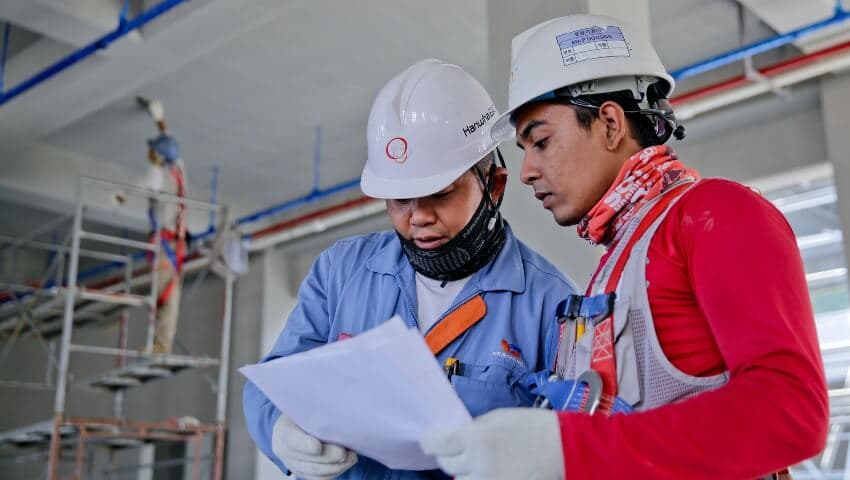7 of the Most Common Construction Insurance Claims

The warmer weather of spring means construction season is ramping up. In this article, we’re examining popular claims for commercial construction insurance.
Construction is a risky business, and accidents or unexpected events can happen at any time. That’s why having proper insurance coverage is essential for any construction project. Construction insurance provides protection against a wide range of risks, from property damage to worker injury or environmental damage. In this article, we’re taking a look at some of the most common insurance claims in construction. By understanding these claims, you’ll be better equipped to protect your business and avoid costly lawsuits down the road.
Related Read: How to Start a Construction Business in Canada
Need Insurance for Your Small Business?
1. Property Damage Claims
One of the most common construction insurance claims is property damage. This refers to damage or loss to the physical structure of a building, machinery or equipment on a construction site. Property damage claims can be caused by a variety of incidents, such as natural disasters, theft, vandalism or accidents involving machinery. For instance, a crane could malfunction and fall, damaging the building below. Or, a severe storm could knock down a wall or damage the property. In either case, property damage claims can create significant financial and liability risks for the contractor responsible for the site.
How to avoid property damage claims
Here are some common ways to avoid property damage claims:
Conduct a thorough site inspection before construction begins to identify potential hazards
Secure the construction site to prevent unauthorized access
Develop and enforce safety protocols for workers and visitors
Maintain insurance coverage that includes property damage claims
Need Insurance for Your Small Business?
2. Workers’ Compensation Claims
Workers’ compensation is another common construction insurance claim. This provides coverage for medical expenses and lost wages for employees who are injured or become ill on the job. Construction workers are exposed to numerous hazards, such as falls, accidents with heavy machinery, or exposure to toxic materials. These can result in serious injuries or illnesses. Getting workers’ compensation claims can be costly and time-consuming for contractors. It often involves medical bills, rehabilitation costs, and legal fees.
How to avoid workers’ compensation claims
There are some common ways to avoid these claims, such as:
Conduct regular safety training for workers
Encourage workers to report unsafe conditions
Provide workers with appropriate safety gear and equipment
Regularly inspect the job site for potential hazards
Need Insurance for Your Small Business?
3. Equipment Breakdown Claims
Another common issue in construction projects can be equipment breakdown claims, which can lead to costly interruptions and delays. Equipment breakdown insurance covers damage to machinery and equipment due to a sudden and accidental mechanical or electrical failure. In construction, a breakdown of machinery or equipment may cause delays, downtime and even safety concerns. For instance, some scaffolding could fall or a crane could malfunction, causing a costly repair or replacement.
How to avoid equipment breakdown claims
Contractors should regularly maintain and check their machinery and equipment to prevent equipment breakdown claims. This will ensure the machinery and equipment works at its best capacity.
4. Builder’s Risk Claims
Builder’s risk is another common construction insurance claim. This covers loss or damage to a construction project during its construction or renovation. Builder’s risk typically covers the physical structure, materials, and equipment during construction. An example of this type of claim is when a severe weather event causes damage to a construction site or theft of material from the site.
Related Read: When Should Builder’s Risk Insurance Start?
How to prevent builder’s risk claims
To prevent builder’s risk claims, contractors should:
ensure that their construction sites are protected against weather events
properly monitor and supervise the construction site
Need Insurance for Your Small Business?
5. Professional Liability Claims
Professional liability covers damages and legal fees caused by any professional negligence or errors of construction professionals. Construction professionals can face liability claims for mistakes in design or inaccurate plans, as well as project delays. These claims can have serious consequences for property developers, contractors, and individuals alike.
Related Read: Does Professional Liability Insurance Cover Negligence?
How to avoid professional liability claims
Construction professionals can take a number of steps to avoid being held liable. For instance, they can:
ensure that they follow safety and quality standards
review plans and specifications frequently
keep detailed records of all project-related transactions and communications.
Need Insurance for Your Small Business?
6. Delay and Disruption Claims
Delay and disruption claims are another common construction insurance claim, which provides cover for financial losses resulting from delays or disruptions to a construction project. In construction, delays can be caused by various factors such as weather conditions, labor strikes, supply chain disruptions, or changes in project design, among others. Disruption claims, on the other hand, occur when work on the site is interrupted or disrupted due to external factors outside of the contractor’s control, such as government actions.
How to prevent delay and disruption claims
To prevent delay and disruption claims, contractors should:
plan ahead
conduct regular progress reviews
maintain open and transparent communication with project sponsors and stakeholders to ensure that all parties are aware of any changes to project timelines or scopes
By doing so, contractors can minimize the risk of significant delays or disruptions in construction projects and reduce the likelihood of costly legal disputes.
Need Insurance for Your Small Business?
7. Environmental Claims
Lastly, environmental claims are becoming increasingly common in the construction industry. Environmental claims can arise when construction projects cause pollution, contamination, or other types of environmental damage. Contractors involved in construction activities should be aware of regulations governing environmental protection and take appropriate measures to avoid causing damage to the surrounding environment.
How to avoid environmental claims
To minimize the risk of environmental claims, contractors should:
adopt best environmental practices
have proper waste disposal procedures in place
use environmentally friendly construction materials
Contractors should also be aware of the environmental risks associated with construction activities and take corrective action if any adverse impact is identified. By taking proactive steps to minimize environmental risk and damage, contractors can avoid costly environmental claims and protect the environment.
APOLLO makes insurance effortless with coverage that’s catered to different business types, so you’re only paying for the insurance you need. Get a free quote in less than five minutes and we’ll email your documents directly to your inbox.
APOLLO Has You Covered
Get the protection you need in minutes with custom Business Insurance from APOLLO.
Originally published April 12, 2023, updated August 25, 2023
Back to APOLLO MagazineGet Tenant Insurance in less than a minute
Get no-nonsense coverage that's the best value for your money. Purchase policies from your computer or phone, receive your documents instantly, and save when you buy online.
4.7 rating
Get Tenant Insurance in less than a minute
Get no-nonsense coverage that's the best value for your money. Purchase policies from your computer or phone, receive your documents instantly, and save when you buy online.
4.7 rating
Relevant articles
Getting insured is as easy as 1 - 2 - 3

Tell us (very little) about yourself
Just tell us your address, your name, email and phone number. And that's it. We'll give you a price in less than a minute.

Pay online easily and securely
You can choose to pay monthly or save money by paying for the entire year in one easy payment.

Get your documents in your inbox - instantly
As soon as you complete your purchase, you'll find your proof of insurance and policy documents waiting for you in your inbox.
Get covered today - it couldn’t be easier
We’ve provided more than 1,000,000 quotes to Canadians just like you. Give it a try!



